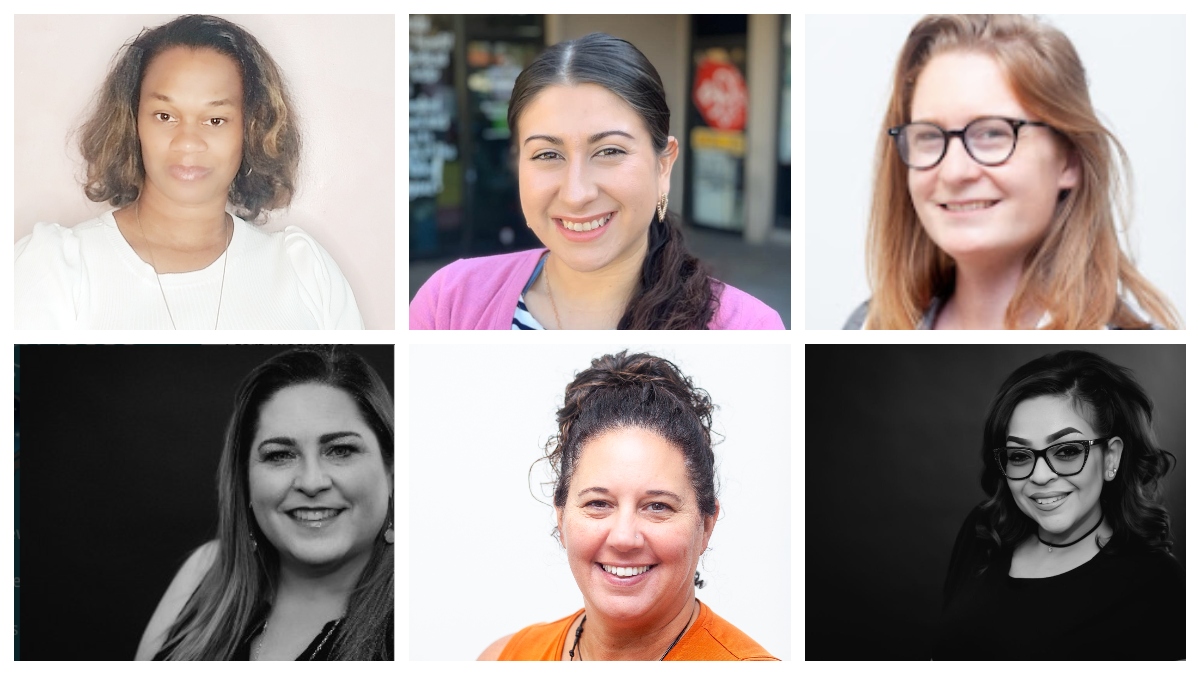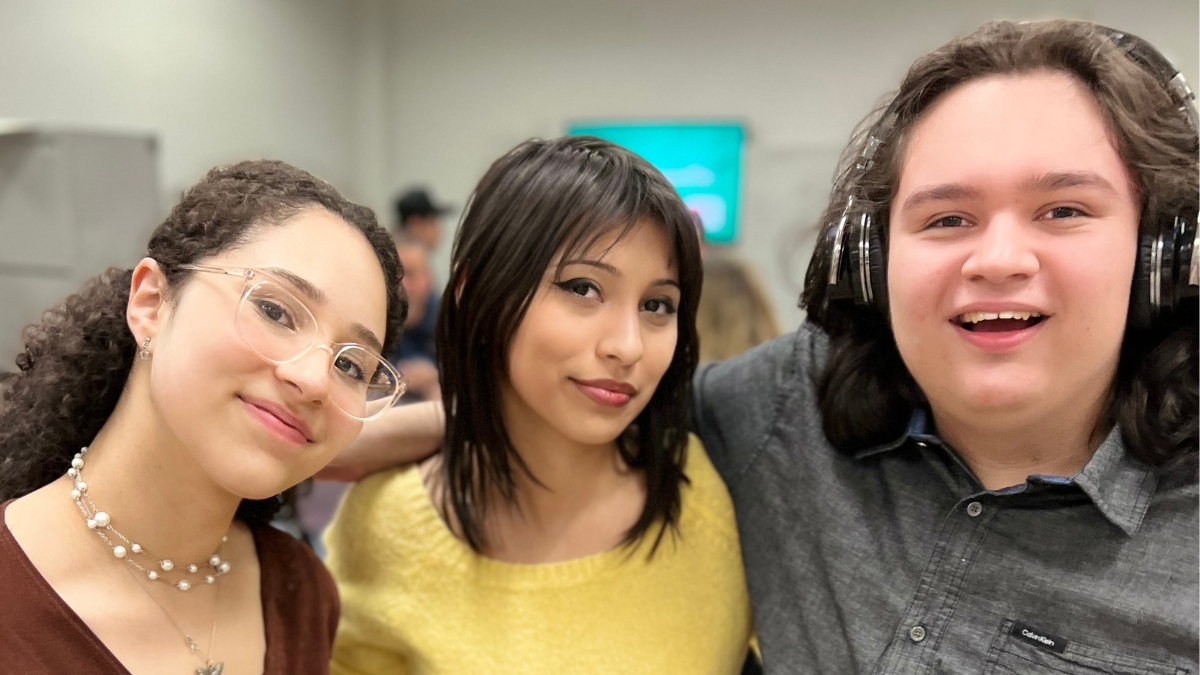- Home
- About
- Resources
- Monday Message
- College and Career
- Connect with a School Counselor
- Counseling (Student Support)
- Family Guidebook
- Homeless Youth Services
- iLEAD’s Commitment To Equity
- Mental Health Resources
- Pregnant and Parenting Resources
- School Lunch Program
- Technology Use Agreement
- Workforce Innovation and Opportunity Act
- Calendars
- Contact
- Enroll
EG Guides Capitalize On Consistent Collaboration, Coaching For Higher Quality Project Design, Learner Success

For practitioners of PBL, the project design process is essential to learner success. With this in mind, the team at Empower Generations – known as guides – have instituted a collaborative process that demonstrates the value of taking one’s work public, as well as using feedback to improve the final product.
On a recent Friday morning, they gathered, like they do every week, to discuss their current projects. They were joined by their Director Malaka Donovan and PBL Global’s Dr. Thom Markham. In real time, the team embraced the iLEAD IDEAL elements of PBL – PBL Culture, PBL and Intellectual Challenge, Authenticity, Assessment, Project Design, PBL Process and Product, as well as Culture of Reflection.
The Why
The guides meet weekly in order to plan interdisciplinary projects, connect content across the curriculum and share best practices, according to Donovan.
“This time also provides an opportunity for them to know one another’s content so they can support any learner academically,” said Donovan.
For three years, this team has been meeting weekly to co-design their six-week workshop cycles. They break these down this way: Week 1 (entry event, project info), Weeks 2 – 4 (learner inquiry and content), Week 5 (application and project build) and Week 6 (presentations, reflections and assessments).
“Through trial and error and many conversations, we concluded that learners tend to be more successful in consistent cycles,” said Donovan.
The Experience
Guide Tanya Fornelli’s current six-week focus is an interdisciplinary project entitled “Never Again ” that focuses on the competency of Global Research and Analysis. The driving question: “To what extent does the analysis of the 10 stages of genocide help us recognize that the world community is making progress in preventing genocide?”
Fornelli said her team believes this collaborative process is essential to high quality, interdisciplinary project design. According to Fornelli, they believe that the collaborative process motivates them to come up with creative project ideas and brainstorm learning activities that will engage all learners.
“The process of designing projects every six weeks is highly collaborative and effective for providing more personalized learning experiences,” she said. “When discussing project ideas, we focus on what our learners need, where their interests lie, and the skills and concepts that need to be reinforced.”
Guide Jeanette Chadwick’s current project integrates physical science and film as learners explore the competency of Creativity and Prototyping. The driving question is “How can science help make movies more realistic?”
Chadwick loves how the team comes together to collaborate on project topics and skills using learner input and data.
“We share evidence and experiences to help each other build projects that will best serve all learners,” she said. “We try to help each other adapt and bring fresh ideas.”
Power of the Process
Guide Marian Tell-Coffield – whose current project is a Bio/Chem endeavor that looks at some of the social and scientific reasons for convictions using forensics – emphasizes that the guides gain insight on different directions one can take. She said that this makes the project blossom into something that the learners can have a deep interest in learning about.
“We know our learners and when we come together, we see our collective work improve,” she said.
Care Team Member Danielle Padilla enjoys the creative process of the collaborative work and that they are all hearing one another’s perspectives and feedback. She said it really mirrors the way PBL works.
“It’s powerful because other perspectives can only strengthen one’s work,” said Padilla. “The individual work just becomes stronger and more creative, as well as relevant for the learners to gain those competencies they are needing.”
Coaching Perspective, Advantages
PBL Coach Dr. Thom Markham believes that project-based learning is just too big for one brain. He insists that it is a creative endeavor that not just benefits, but requires input from multiple perspectives.
“When done in an open-ended, trusting environment, projects become deeper, more engaging and ultimately more challenging for learners.”
Markham would love to see others in education embrace this collaborative project design and planning process. He advises those whom he coaches to not start with the standards or ‘what is necessary to cover.’ Instead, he recommends always starting with the big idea, vision and challenge.
“Get the vision and idea clear, then incorporate the standards into the project,” said Markham. “That is the secret sauce to engaging, memorable projects for learners.”
The Empower Generations staff believes that Markham’s contributions as a coach just adds to the nature of sharing one’s work publicly and embracing a truly collaborative approach.
Fornelli believes that the coaching helps deepen the scope of her projects by broadening the lens to a more global perspective. For example, she said that Markham discussed with her the impact of social media in the conflict between Russia and Ukraine.
“Thom challenges us to deepen our projects and continually instill hope in the minds of our learners,” she said.
These guides feel that having the coach reminds them to make the learning accessible to all learners, according to Tell-Coffield.
“Thom’s suggestions gave me permission to simplify the work of the activity but not reduce the outcome of student learning and their project in the process,” she said.
Final Comments
Markham is impressed with the creativity from the Empower Generations Guides. He appreciates their focus on authentic learning experiences and enjoys being a part of the process of refining good projects into great projects.
“Working with this staff always reminds me that too much focus on curriculum and standards does not result in the best projects,” he said. “These guides always start from the needs of their learners.”
For Donovan, this illustrates how the collaborative process produces high levels of creativity and autonomy.
“We design our curriculum around interests, skills and state standards in order to increase motivation and retention,” she said. “The collaborative process truly helps keep the passion in our profession.”
RECENT POSTS

Upcoming Events
Tues., 8/13: First Day of 2024-25 School Year Mon., 9/2: Labor Day Click here for the school year calendar.

Summer Meals for Your Family
We want to make sure all our families have access to meals this summer. Please see the tools below if you need assistance. Summer Meals Program (SFSP) When school is Read more…

Enrollment Is Open at Empower Generations
Enrollment is open at Empower Generations for the current or next school year for students in 9th-12th grade. If you are interested in enrolling, please fill out the form below: Read more…
